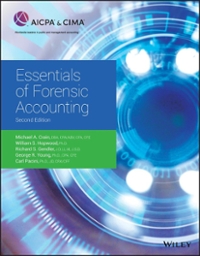Jerry is the sole stockholder in a C corporation that operates a chain of retail stores that
Question:
Jerry is the sole stockholder in a C corporation that operates a chain of retail stores that specializes in selling home furnishings, such as furniture, curtains, rugs, and garden ornaments. He started the business 15 years ago and has done so well that three years ago he began looking into ways that would help him lower the amount of corporate taxes paid each year. Things haven't been going so well on the homefront: He and his wife, Pam, have not been getting along for the last two years. Pam and Jerry have seen a marriage counselor and, during a few of these sessions, Jerry has complained about how their marital woes have adversely affected his business. "The bottom line is taking a hit because I can't keep my mind on my business," Jerry recently said to his friends and anyone else who would listen. Jerry and Pam soon came to the conclusion that they should divorce. They each retained separate attorneys. and you were hired as the forensic accountant by the attorney who represents Pam. You've been pouring over the financial records of the business and have noted that for the most recent year, the income tax return of the corporation (Form 1120) showed sales of \($10,000,000\) and cost of sales of \($4,500,000.\) The other expenses totaled \($3,750,000\) leaving income before income taxes of \($1,750,000.\) You note that inventory and cost of sales is determined by applying the last-in, first-out (LIFO) method. An analysis of the inventory reveals that the difference between LIFO and first-in, first-out (FIFO) (FIFO is believed to state inventory at an amount closer to its current value) is \($325,000.\) Furthermore, you discover the following items that relate to the current year: . An IRC Section 179 expense of \($300,000\) was taken on qualified equipment during the year. This amount is \($240,000\) greater than the modified cost recovery system deductions that would have been taken had Jerry not claimed the IRC Section 179 expense. Cost recovery deductions (that is, depreciation expense) of \($5,000\) for a personal vehicle (used entirely by Pam) were deducted on the corporate income tax return. Expenditures of \($400\) for repairs and mainte- nance, license tag renewal, and tolls pertaining to this vehicle were also deducted. Expenditures of \($10,000\) that appear to have been for a personal vacation were deducted as travel and entertainment. A salary of \($1\) million was paid to Jerry, and a salary of \($250,000\) was paid to Pam. You questioned Pam about the salary and found that she was unaware that she was being paid. Furthermore, she said that she wasn't involved at all in the business. When you compared Jerry's salary to the salary he had been paid over the years, you found that it had increased by 5 percent in each of the last five years until last year, when it was increased from \($450,000\) to \($1,000,000.\) Repair expenses appeared to be \($75,000\) higher in the current year than the average of repair expenses during the last five years. When questioned about this, Jerry seemed to hesitate and then muttered, "There were a lot of repairs last year, weren't there?" The maintenance person in charge of the store where the re- pairs were believed to have been made insisted that no repairs had been made. Further examination of the vendor invoices revealed that the expenditures were for the acquisition and installation of an in-ground pool and materials to construct a screened-in patio. Your follow-up with Pam confirmed what you had suspected: The patio and pool work had been done at Jerry's and Pam's residence.
Required
a. What is the amount of income before income taxes for Jerry's business after normalizing the income?
b. What questions would you like to ask Jerry about the salary of \($250,000\) paid to Pam, and what might you do before pursuing this line of questioning? Are there any other procedures that you could perform in this situation?
c. Which items in your adjustment used to arrive at the income before income taxes in part (a), if any, do you think Jerry, his attorney, and their forensic accountant will contest?
Step by Step Answer:






